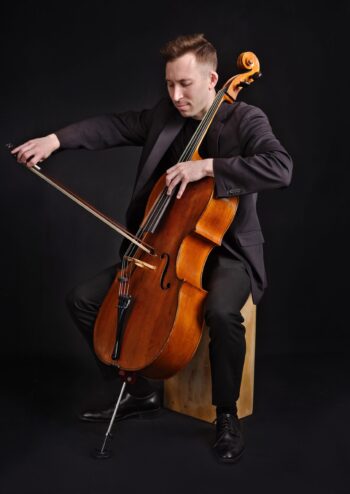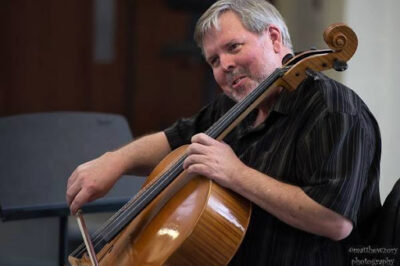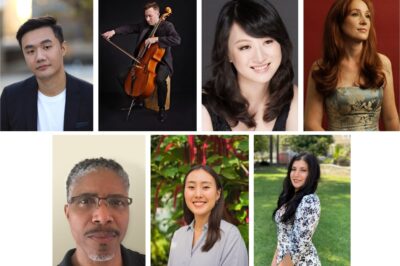Michael Kaufman

Founder and artistic director of Sunset ChamberFest and founding member of the cello quintet SAKURA, Michael Kaufman champions eclectic juxtapositions of music from the classical and contemporary canon and is an advocate for cultivating future generations of composers. Michael recently joined PCM as Chair of the Chamber Music Department and a faculty member of the Strings Department. Below, he shares a little about his musical background, as well as his aspirations for the department.
What first drew you to playing the cello, and later to playing chamber music?
I started playing cello when I was about four years old. My next door neighbor (the same age as me) had already been playing cello for a year and since we did everything together, I was jealous of her! My parents aren’t professional musicians but they are both passionate listeners of classical music and my mother actively sings in several groups in Cleveland.
My introduction to chamber music was through the Cleveland Institute of Music Prep program, and my first memories are playing a movement of a Mendelssohn quartet and then the last movement of the Mendelssohn Octet. When I was fourteen, I started attending ENCORE School for Strings and shortly after, the Sarasota and Norfolk music festivals. At Sarasota, I had the opportunity to work with Robert Levin who is still one of my living legends and at Norfolk, I learned a tremendous amount from the Fine Arts and Tokyo String Quartets.
How has chamber music influenced you as a musician, as a person?
I think that chamber music influences the way that I interact with other people and how I approach problem solving. When you are in a chamber group, everyone is equal and everyone’s opinions and feelings matter. If we need to solve a problem with the ensemble or agree on the musical direction of a phrase (these are sometimes related) I’ve learned to listen to others with an open mind, even as this can be hard when I have a different perspective. But learning how to approach a problem with “How do you feel about…”, “What are your thoughts on…”, “Would you consider…” etc. encourages the others to speak freely and feel more comfortable. Frequently this also leads to an even better musical outcome.
What interested you about joining the PCM faculty and in accepting the department chair position?
My introduction to PCM chamber music was at the Chamber Music Intensive in June 2022. I was absolutely blown away by the level and commitment of the playing and I was also moved by the warmth and openness that I received from the students. I had to give a masterclass on the Brahms G Major Sextet and I was getting very nervous as they played because it all sounded so beautiful and professional and I wasn’t sure what I could say!
Do you have any goals or aspirations for the department? Is there a particular teaching philosophy that inspires how you coach ensembles?
I’m particularly interested in seeing how some of the younger students develop over the coming years. It’s a remarkable opportunity to start chamber music at such a young age (we have some students under 10 years old!) and when you have that foundation, who knows how far you can go, even by your teenage years. I’m also eager to support the groups who are serious and want to really push themselves to perform at a high level and even pursue major competitions. At the core of my philosophy, I believe that students need to have a deep respect for each other and the music. This translates into developing a higher level of listening to themselves and their chamber partners. Regardless of whatever career path they should choose, this will help them learn how to better interact with others in a group setting and their heightened listening skills will serve them well in any type of music that they pursue.
Can you tell us about Sunset ChamberFest? How has your experience as founder and artistic director shaped your passion for chamber music?
Sunset ChamberFest is a festival that I started in 2014 that has an emphasis on chamber music and especially new music. We have had over 80 students in our Young Composers Workshop where they write pieces under the guidance of a faculty composer and then we workshop, perform, and record these pieces. We also present chamber music concerts with a mix of music (new and old) usually centered around some cohesive theme. I have learned a lot from this experience–I’ve learned about programming full concerts and about how to give all of the artists enough music to be challenged but not so much that they are overwhelmed. The biggest reward I’ve gotten is the opportunity to play with some truly amazing musicians and to take the time to seriously rehearse each piece.
As a champion of contemporary works, how would you like to integrate such repertoire into the Chamber Music Department?
I believe that contemporary works can teach us so much about just how fresh and full of energy all music was at some point! We sometimes forget this when we are playing something that was written 200 years ago. But new music reminds us that all music had this daring, improvisatory quality, once upon a time. Over their time at PCM, I’d like all of the students to experience some contemporary music as part of their chamber music studies. In addition to the musical benefits, playing contemporary music pushes one’s reading, technical, and rhythmic abilities.
You have participated in a number of prestigious festivals all over the world. Is there any experience that stands out as particularly memorable and meaningful to you?
In 2017, I had the opportunity to play the Brahms Piano Quintet with Leon Fleisher. Just being in the presence of a musician like that is transformative. In the beginning of the second movement, the piano has the melody and the cello has a pizzicato note at the beginning of each bar. Every time, he put the downbeat in a different place and I remember having to use all of my focus to try to feel the phrase just like he was feeling it–otherwise predicting it was impossible.
If you were stuck on a desert island with just one piece of music to listen to, what would it be and why?
I would take Steven Isserlis and Thomas Adès’s recording of the Schumann Intermezzo (originally for violin and piano). It is just stunningly simple and beautiful and the performance is dreamy and honest, simply reflecting the colors that are already in the music.
Anything else you would like people to know?
I have been really interested in language learning and have been studying Mandarin Chinese since the pandemic. If you speak Chinese and can tolerate my bad grammar and limited vocabulary, you can try to talk to me. Sometimes I’m shy about it but I’m trying to speak more!



